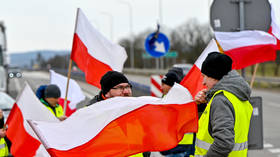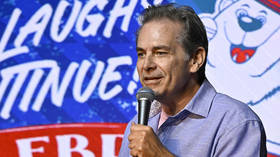ROAR: Latvia to limit Russian-speaking TV broadcast

As the Latvian authorities prepare to cut broadcasts in minorities’ languages, Russian policy-makers consider ways of improving relations between the two countries.
A new attempt to limit programs created in Russian and other minority languages on Latvian television has been launched in the country’s parliament, the Seim, opposition leaders have warned.
The parliament’s commission on human rights and public affairs supported amendments to a new law on electronic mass media that introduce limitation on broadcasting in non-state languages. The idea had been floated by the commission on constitutional legislation under the Latvian president.
Television channels having “national status” will be obliged to broadcast in Latvian not less than 65 per cent of airtime. This decision contradicts the rule of the constitutional court, which earlier removed “broadcasting language quotas,” said representatives of the Center of Accord, the largest opposition Russian-speaking movement.
“The commission has not only proposed to return quotas on broadcasting in a non-state language, but has also invented a number of new limitations,” the center’s press service said.
The members of the commission were “very creative” in interpreting the EU directive, according to which not less than 51 per cent of broadcasting should be covered by programs produced in the EU or states participating in the European Convention on Transfrontier Television, said Boris Tsilevich, a deputy from the Center of Accord.
The directive should defend European TV production from Hollywood, the deputy believes. However, the Seim’s commission supported the amendment, according to which up to 40 per cent of airtime should be filled with programs or films created in the state language.
Thus, these programs should be initially created in Latvian, not dubbed from other languages, the deputy stressed. Moreover, these programs will be broadcast in prime time. “Any channel having Latvian jurisdiction will be obliged to broadcast in Latvian throughout prime time, abandoning, for example, news in Russian,” Regnum news agency quoted him as saying.
Such norms contradict Article 9 of the Council of Europe’s Framework Convention for the Protection of National Minorities, Tsilevich said.
The presidential commission went further and proposed to broadcast all commercials in Latvian, even during broadcasts in other languages. However, the parliament’s commission has not supported the proposal.
Observers believe the language issue has been raised again to help some politicians who want to run for parliament’s seats in the autumn elections and distract the public’s attention from economic and social issues.
In 2003, the country’s constitutional court recognized 25 per cent quotas for broadcasting in foreign languages. The current move may become ineffective after the transfer to digital television, Tsilevich believes.
“Technically, every company will be able to broadcast simultaneously in several languages on the same frequency,” he said. “A channel may also be registered in another EU country to avoid any quota regulations.”
Analysts and politicians in Russia see possible changes in broadcasting legislation as part of the problems minorities are facing in Latvia. However, this move is unlikely to change the current level of Russian-Latvian relations that have seen signs of thaw in recent months.
Ironically, in May, Latvia held a special event dedicated to Russian television. And the Latvian President Valdis Zatlers visited Moscow on May 9 to attend the Victory Day celebrations.
However, on May 17, Russian officials felt compelled to make statements about a controversial decision of the European Court of Human Rights in the case of Vasily Kononov, a Soviet World War II veteran.
At the same time, the two countries are continuing co-operation, and the fourth session of the Latvian-Russian intergovernmental commission on economic, scientific, technological, humanitarian and cultural co-operation is held in Russia’s city of Pskov on June 4.
The possible controversial decision on broadcasting does not seem to be influencing the current relations between Russia and Latvia. However, Russian politicians made it clear that they will track the situation with minorities in the former Soviet republic.
Almost 30 per cent of its population is ethnic Russian, which makes it the largest minority group. Some 300,000 of the 2.3 million Latvians do not have citizenship and cannot vote in elections.
The so-called “non-citizens” are “the problem of Latvia, not Russia,” a deputy speaker of the State Duma, Lyubov Sliska, said on June 2.
This topic has been discussed for the last 20 years, but no result has been achieved, she noted. At the same time, she expressed hope that Latvia “will solve this problem because the existence of non-citizens in Europe is a strange phenomenon.”
Another deputy speaker of the Russian parliament and leader of the Liberal Democratic Party Vladimir Zhirinovsky, who visited Latvia recently, disagrees that Russians in Latvia should learn the state language.
People should be able to speak Russian in their neighborhoods and at work if the majority of those around them speak the same language, Zhirinovsky told journalists in Riga. He assumed that the problem of non-citizens would be solved sooner or later.
“I think Europe will force Latvia to remove the status of a non-citizen, which is not used elsewhere, except Latvia and Estonia,” he said. “It is unacceptable. Europe will not recognize it.”
The Russian-Latvian relations should be improving, Zhirinovsky said, adding that Russia “has no conflicts” with this Baltic republic. In autumn, any democratic party could win elections in Latvia and it will “reconsider the problem of non-citizens and the status of the Russian language,” he predicted. According to the polls, the Center of Accord enjoys considerable support of the voters.
Some Latvian analysts think that the relations between the two countries may, among other factors, depend on developments in the Kononov case and the report prepared by Evgeny Primakov, former Russian prime minister and president of the Chamber of Commerce and Industry, who visited Latvia in May.
In Riga, Primakov described the relations between the two countries as “good,” but added that they could be better, Regnum news agency said. Russians were never “occupants” in Latvia, he stressed.
It is wrong to think that Russia is jealous of the European aspirations of former Soviet republics, he noted. But these aspirations should not be combined with “cutting relations” with Russia, he added. He urged Latvian politicians to remove “irritating factors” and keep balance in the Latvia’s relations with the West and the East.
Russian envoy to NATO Dmitry Rogozin believes that it would be easier to solve “old humanitarian problems” in the Russian-Latvian relations if political forces defending equal rights and mutual understanding between the Latvian and Russian communities in the country win the autumn parliamentary elections.
“Russia may allow itself to be generous and forgetful,” Rogozin said at the meeting with Latvian veterans of WWII on June 1. “But Latvia should also be brave enough to make a breakthrough in the relations,” he noted.
Sergey Borisov,
Russian Opinion and Analysis Review













